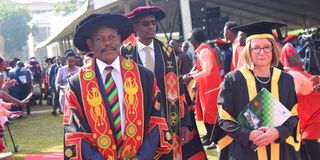Makerere must rise above petty squabbles

Makerere University Vice Chancellor, Prof Barnabas Nawangwe arrives for the graduation ceremony at Freedom square on February 13, 2022. PHOTOS | FRANK BAGUMA
What you need to know:
- The issue: Makerere University
- Our view: Petty squabbles by lecturers and administrators must not be allowed to ferment its yeast on the academic files of students.
Right in the midst of what should have been a great celebration of academic excellence as Makerere University graduated over 13,000 students, First Lady Janet Museveni wrote to the University Council a second time over a rather unfortunate incident.
Ms Museveni, who is also the Education minister, had in August last year written to the Council about a student at the College of Education and External Studies whose completion of doctoral studies was being frustrated by the very academics entrusted with nurturing excellent graduates.
The student, Mr Peter Dithan Ntale, must have been alone in running from one office to another, to the court of law and finally appealing to the Education ministry, but he mirrors the trials and tribulations of many others who are often trampled on by elephants fighting for leadership positions at the university.
At the East African School of Higher Education Studies and Development alone, at least five PhD students have been victims of this unfortunate culture that has festered from a sore into a wound and could as well be a dangerous cancer needing dire intervention. There are probably many others across the country’s premier institution of higher learning.
Students who pay fees that pay salaries for the lecturers and administrators, students who invest a lot of psycho-social and economic resources into their academic pursuit should be running from one office to another, the court and to the Education ministry to move those charged with seeing them through.
Moreover, the High Court in 2021 gave Makerere the benefit of the doubt when it ruled that the court of law was not a place for students to run to on matters that universities had clear policies on how to resolve. The court said it was not its place to get involved in examination administration and management by questioning such marks of excellence as the external examination report. While it was a distressed student who had petitioned the court, the verdict was binding on Makerere and every other academic institution on the land. It is their cardinal duty to give the students the best possible opportunity to fulfill their academic dreams. That cardinal duty cannot include university administrators engaging in detrimental politics.
No single student gets admitted into a university on a sightseeing escapade. They have big dreams. Some lose track along the way, which is unfortunate enough. Others persevere to the end and therefore deserve every support possible to help them get through the hurdle meritoriously and for the good of the nation. Petty squabbles by lecturers and administrators must not be allowed to ferment its yeast on the academic files of students.
For Makerere, the ‘greatness’ in its anthem is meaningless when students must first get the attention of a minister to move those charged with a duty to nurture them.
‘Build for the future’ must not become mere rhetoric in the face of university politics.




